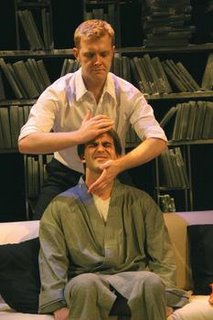
Outside It’s a warm July evening in Covent Garden, but within the Tristan Bates Theatre the stage is set as a contemporary Manhattan apartment, complete with chrome Smeg fridge and white leather sofa, and the date is September 11 2001.
Covered in debris and ash, Matthew is standing face to face with his wife, after having escaped from the World Trade Centre. In this New Company production we witness his mental decline and marriage collapse following the attacks on New York.
Alex Zorbas and Kelli Kerslake give fervent performances as Matthew and Marta whose approaches to life are at antitheses. He is intellectual and doesn’t care for money. She is decadent, materialistic and doesn’t approve of over-thinking things.
There is a very black humour to Marta’s crass character. The first thing she says when she sees him following the attacks is, “Oh my God, we have no money.”
When she discovers that through insurance money they receive from the ordeal, they are saved from bankruptcy, she says “God does things for a reason” and toasts to the fact their apartment is saved.
Matthew develops a despondent demeanour and becomes disconsolate with Marta. He begins to confide in a TV cameraman, telling him that he feels small and undeserving. As Matthew becomes more aloof, Marta forms a relationship with their smooth lawyer.
The final scene is the strongest as an ostracised Matthew, near naked and sweat-covered under the dim yellow spotlight of the TV camera, confesses, “Everything I feared was true about my life was true.”
Undoubtedly, this play will leave you feeling shell-shocked and rather depressed. During each scene change, we witness sound effects of chatting and laughing, terminated by a harrowing crash, which I assume represents the first plane hitting the Twin Towers
New York playwright Francine Volpe’s script shows how a big event can create moments of epiphany. We learn how Matthew and Marta had been drifting apart and attending counselling before 9/11 but it is the event itself that triggers Matthew’s rapid mental deterioration.
Volpe suggests most World Trade Centre survivors acted in desperation rather than heroism. When the TV crew interview Matthew and ask if he witnessed any acts of bravery, he sharply retorts “No”. He says people ran over him and someone stepped on his neck.
As Volpe touches on how New Yorkers’ behaviour on public transport has changed since 9/11, we wonder if Matthew’s situation maybe representative of others since the events, but this idea, like many others could have been further developed.
If you are prepared for a thought-provoking if rather bleak evening, then I would recommend the play. However, there will no doubt be plenty more post-9/11 themed plays to come that may encompass more depth, questions and answers. If you’re prepared to wait for those, you may prefer the prospect of a pint outside in the sunshine in Covent Garden.
This review originally featured in the Camden New Journal, Islington Tribune and West End Extra.


